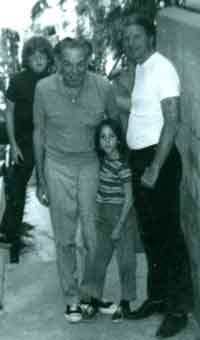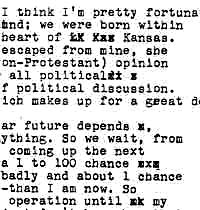My father had Parkinson’s disease.
James Parkinson was the British doctor who puzzled over the disease and first described it in 1817. Later, other doctors found out that the normal age of onset of Parkinson’s disease is about fifty-seven. That was my dad’s age when he first wrote about his symptoms.
The ailment often begins with a slight “pill-rolling” tremor of the hands and slowly progresses over ten to twenty years, ending in the worst cases in paralysis, dementia and death.
It affects about half a million people in the United States alone, with about fifty thousand new cases each year. One doctor said he suspected everybody in the world would get Parkinson’s if they lived long enough.
“Early symptoms of Parkinson’s disease are subtle and occur gradually,” says the Web site of the National Institute of Neurological Disorders and Stroke. “Patients may be tired or notice a general malaise. Some may feel a little shaky or have difficulty getting out of a chair. They may notice that they speak too softly or that their handwriting looks cramped and spidery. They may lose track of a word or thought, or they may feel irritable or depressed for no apparent reason. This very early period may last a long time before the more classic and obvious symptoms appear.
“One of the most demoralizing aspects of the disease,” says the Web site, “is how completely the patient’s world changes.”
Brick was born to be a writer. But by late 1960 —
Albany, Calif.
September 28, l960
I have found that much of my reluctance to write was caused by a curious inability to punch the keys of a typewriter. My doctor thought it was probably the other way: that my inability to use a typewriter was based on a profound and deep reluctance to write anything. I beat it, at least partly, by buying one of those beautiful little Smith-Corona electric portables — which I have now learned to use quite well.
Gradually, now that I have my little sky-blue Corona-doll, I have come to write more and more letters to people I know.
June l2, l96l
My right hand still cannot type (nor handwrite). My doctor says it may be early Parkinsonism which is not fatal unless it becomes late Parkinsonism — which it doesn’t always do. Meanwhile, I’ve an appointment to see a neurologist. I’m told they have medicines which can ameliorate the symptoms so that perhaps I can write again. If they don’t — I don’t know whether I can do a job of writing or not.
Over the years, Brick’s condition worsened. His speech slurred and he began to shuffle. His conversational powers dwindled.
His second wife — my stepmother — died in 1967 after a marriage of some thirty years. Brick was shattered. Ill and lonely, fearful of a heart condition because of an attack back in 1945, he soon sought out an old friend, and —
Los Angeles 90049
December l7, l968
I must tell you what’s happened to me.
Chiefly, what’s happened is that I’ve married again — to my astonishment. There are several contributing causes, but I guess the chief one was that I found I couldn’t live as a “loner”; I had always wished for solitude — and when I finally got it, I found I couldn’t take it.
Actually, this is the culmination of a romance that began in l920; Peggy was the first girl I dated when I was a freshman at USC a whole lifetime ago, and we have remained warm friends ever since, despite a couple of marriages on my part and one on hers.
As you may imagine, I did find it very difficult to adjust after Naomi’s death. As long as there were things to do I managed to keep going and tried to carve out a life pattern which would include frequent visits to the homes of my children, etc. etc.
But it gradually dawned upon me that this was no life; coming and going I would be constantly interrupting the lives of my children or, if I chose to live with any one of the three families I would necessarily throw their own lives out of balance “taking care of Grandpa.”
Still that was the way things seemed to be shaping up until I went to the Motor Vehicles Department to have my driver’s license renewed. There the man at the window said: “So sorry. You have Parkinson’s disease? No driver’s license!”
That put me in the hole. I did get a temporary license pending a hearing on my contention that I was able to drive a car. But I learned that there was little chance I would ever get a license so long as I had Parkinson’s.
I knew there was some kind of operation to cure it, so I tried the neurosurgeon at Kaiser Hospital, but he didn’t want to do it — and I got the impression that he wasn’t very skilled at that sort of thing.
But fortunately, I’d been in touch with Peggy, who lives in West Los Angeles, and her doctor was in close contact with the neurosurgeon at UCLA who is one of the top men in the country on this sort of surgery — so Peggy said, “Come down and see what we can do.”
And so I came down and eventually one thing led to another, and Peggy and I got married and we did get me an appointment with the neurosurgeon, and we did set up an appointment to have this surgery done, and I went to the hospital and was all set when my heart started kicking up, and they postponed the whole business until they were sure my heart was strong enough to take it.
So, meanwhile, after a lifetime of knowing each other, Peggy and I have started to get acquainted and are learning to live without overcrowding in a small apartment.
It’s a topsy-turvy sort of living for me, but Peggy is a warmly devoted person who busies herself about the apartment, drives the car (I now have no license), does the Christmas shopping and, generally, keeps things running smoothly most of the time.
My own activities are limited to taking a four-block walk in the morning and an eight-block walk in the evening and carrying the household trash out once a day.
And that’s besides sitting and counting my pulse and wondering how it’s going to be when (and if) they start drilling holes in my head. (It’s the operation where they open your skull — a little — under a local anesthetic, then probe your brain with a cold probe, while the patient tells them how the stiffness gives way in the muscles when the probe reaches the right place in the brain.)
The operation is pallidotomy. Until the late 1990s, it was the most common type of surgery for Parkinsonism; it has now been supplanted by a process called deep brain stimulation.
Actually, I’m in no worse health than I was a year or two ago. But among the things I can’t do is drive a car and use a pen or pencil — I can’t even take an address or phone number on a phone call and write it down. So I’m practically incommunicado.
The electric typewriter I can still use — up to a point. But by the time I get this far in a letter the frustrations of having to send an independent message to each finger, saying “Hit that m-key” or what ever key it is — the frustration ratio gives me the screaming meemees.
Under the circumstances, I think I’m pretty fortunate. Peggy and I come from the same background; we were born within l00 miles of one another in the dreary heart of Kansas. But whereas I have in some degree escaped from mine, she clings to her WASPish (White Anglo-Saxon-Protestant) opinion to the point where we have to bar all political discussion. And I normally do a lot of political discussion.
But she is a warm and devoted person, which makes up for a great deal.
What life holds in the near future depends, I guess, on what the surgeon does, if anything. So we wait, from day to day, not knowing exactly what is coming up the next day.
The surgeon says that there is a 1 to 100 chance of the operation turning out badly and about one chance in ten I’ll be no better — and no worse — than I am now. So those are pretty good odds.
I’m hoping that when the surgery is over I will be able to get another driver’s license.
I’ve been promising myself I would try a whirl at writing if I get the use of my right hand back.
Despite all this, I will be lonely at Christmas this year. I do miss my grandchildren; this will be the first Christmas since Chuck was born [39 years previously] that I haven’t been a pater familias. But I’m glad it isn’t worse, as it well could be.
Brick’s operation was only a qualified success. He still had to take his levodopa; he still could not type with accuracy and his speech remained slurred and hesitant. Still, the mere fact that he had undergone the process raised his spirits.
February 24, 1969
It seems that I goofed somewhat in predicting my future. I had always supposed that when I was free of Parkinson’s I would just naturally revert to my normally beautiful handwriting and impeccable typewriting. But, alas, I find that I am right where I started from — which is downright discouraging.
This means that I must depend on Peggy to be my secretary.
The rest of the letter was written by Peggy:
Actually, Brick is doing remarkably well in most respects. He is walking with no help, even from a cane, and is walking normally — without the “Parklnsonism shuffle”. He does, at my insistence, carry a cane (when he remembers it) but seldom puts it on the floor for support. His balance and equilibrium are normal, and he is able to control his right foot, leg, and arm normally. There is no discernible stiffness.
The only exception is his right hand, and that is not due to stiffness. He had assumed that he would be able to write and type immediately. But that isn’t the way it works. His nerves and muscles have to be retrained all over again. He still has to watch himself or he falls back into a little of the old shuffle.
In other ways there have been some terrific bonuses from the surgery which we had not anticipated at all. His heart has been so much better it is unbelievable.
Also he sleeps remarkably well and very restfully. And his appetite is excellent.All of these things are so encouraging that they do minimize his disappointment over his inability to write as he had expected.
December l7, l969
I am feeling fine. Peggy really opened the right doors for me. I am now able to walk almost without impairment at all. I still have trouble with my talking; the words just won’t come.